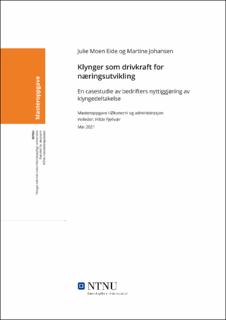| dc.contributor.advisor | Fjellvær, Hilde | |
| dc.contributor.author | Eide, Julie Moen | |
| dc.contributor.author | Johansen, Martine | |
| dc.date.accessioned | 2021-09-22T16:05:01Z | |
| dc.date.available | 2021-09-22T16:05:01Z | |
| dc.date.issued | 2021 | |
| dc.identifier | no.ntnu:inspera:82735216:84627085 | |
| dc.identifier.uri | https://hdl.handle.net/11250/2780509 | |
| dc.description.abstract | Formaliserte klyngeprosjekter har økt i omfang, og har blitt et sentralt innovasjonspolitisk virkemiddel i Norge de senere år, blant annet for å imøtekomme stadig høyere krav om bærekraftig omstilling. Denne masteroppgaven retter søkelyset mot å avdekke forhold som har betydning for bedrifters nyttiggjøring av deltakelse i et klyngeprosjekt. Dette vil belyses ved hjelp av følgende problemstilling:
Hvilke forhold virker fremmende og hemmende for bedrifters nyttiggjøring av klyngedeltakelsen?
For å besvare problemstillingen har vi utarbeidet to forskningsspørsmål på ulike analysenivå:
1. Hvilke forhold internt i bedriften har betydning for deres nyttiggjøring av klyngedeltakelsen?
2. Hvilke forhold i klyngen, knyttet til hvordan den er organisert og drevet, har betydning for deres nyttiggjøring av klyngedeltakelsen?
Studien tar utgangspunkt i det formaliserte klyngeprosjektet Arctic Cluster Team (ACT), som har vokst frem til å bli en ledende industriklynge i Nord-Norge. Oppgaven baseres på et kvalitativt forskningsdesign, der vi har gjennomført dybdeintervjuer av 15 ulike medlemsbedrifter i klyngen. Funn fra intervjuer og dokumentstudier utgjør studiens empiriske fundament, og danner sammen med teori om bedriftsnettverk og næringsklynger, grunnlaget for diskusjonen. Dette leder avslutningsvis til konklusjonen på problemstillingen.
Studiens funn tyder på at høy grad av samhandling er det viktigste for å få ut effekter og nyttiggjøre seg av klyngedeltakelsen. De interne forholdene i bedriftene - forståelse for klyngedeltakelse og strategisk forankring - må ligge til grunn for at bedriftene skal evne å nyttiggjøre seg av klyngedeltakelsen. Forståelsen og forankringen til medlemsbedriftene har betydning for deres utnyttelse av potensialet som ligger i klyngens forhold. De strukturelle forholdene i klyngen - klyngens størrelse og struktur, arenaer og møteplasser, og fasilitering - utgjør rammene for samhandling, og må legges bedre til rette for at medlemsbedriftene i større grad skal evne å utnytte den tilgjengelige kompetansen i klyngen. De sosiale forholdene i klyngen - relasjoner, delingskultur og fellesskapsfølelse - viser seg å være det mest betydningsfulle for samhandlingen i klyngen. | |
| dc.description.abstract | Formalized clusters have increased in scope and have become a key innovation policy tool in Norway in recent years, among other things to meet the increasing demands for sustainable change. This thesis focuses on uncovering conditions that are important for companies' utilization of their participation in a cluster. This will be elucidated with the help of the following question:
What conditions promote and inhibit companies' utilization of their cluster participation?
To answer the main question, we have prepared research questions at various analysis levels:
1. What conditions within the company are important for their utilization of the cluster participation?
2. What conditions in the cluster, in relation to how it is organized, are important for their utilization of the cluster participation?
The study is based on the formalized cluster-project Arctic Cluster Team (ACT), which has grown to become a leading industrial cluster in northern Norway. The thesis is based on a qualitative research design, where we have conducted in-depth interviews of 15 different members of the cluster. Findings from interviews and document studies form the empirical basis of the study, and together with the theory of business networks and business clusters, form the basis for the discussion. This ultimately leads to the conclusion of the study.
The study's findings indicate that a high degree of interaction is the most important thing in order to bring out effects and make use of the cluster participation. The internal conditions in the companies - understanding of cluster participation and strategic anchoring - form the basis for how the companies are able to utilize the cluster participation. The members understanding and anchoring is important for their utilization of the potential that lies within the cluster's conditions. The structural conditions in the cluster - the cluster's size and structure, arenas and meeting places, and facilitation - constitute the framework for interaction, and must be better facilitated so that the members will be able to utilize the expertise in the cluster to a greater extent. The social conditions in the cluster - relationships, sharing culture and sense of community - prove to be essential for the interaction in the cluster. | |
| dc.language | nob | |
| dc.publisher | NTNU | |
| dc.title | Klynger som drivkraft for næringsutvikling | |
| dc.type | Master thesis | |
